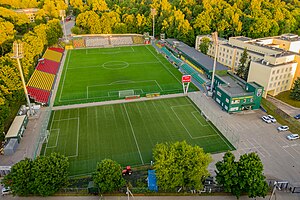LFF Stadium (Lithuanian Football Federation stadium, Lithuanian: LFF stadionas), formerly known as Vėtra Stadium, is a football stadium in Vilnius, Lithuania.[3] The stadium has a capacity of 5,067 people and was home of the Lithuanian national football team between 2005 and 2022.
 Stadium in 2023 | |
 | |
| Former names | Lokomotyvas Stadium Vėtra Stadium |
|---|---|
| Address | Stadiono g. 2 Liepkalnio g. 13/2 (until 2013)[1] |
| Location | Vilnius, Lithuania |
| Coordinates | 54°40′07″N 25°17′40″E / 54.66861°N 25.29444°E |
| Owner | UAB "Vexo projektai" |
| Capacity | 5,067 |
| Surface | Artificial turf |
| Construction | |
| Opened | 1957 |
| Renovated | 2004, 2011–12, 2017, 2021 |
| Tenants | |
| FK Vėtra (2004–2010) FK Žalgiris (2011–present) FK Riteriai (2014–present) Lithuania national football team (2005–2022)[2] | |
History
editThe Stadium was built in 1957 and was first named Lokomotyvas.[4] The Stadium was rebuilt in 2004 and renamed to Vėtra Stadium as the home ground of FK Vėtra. In 2005, the Stadium hosted its first national team matches.[2]
National stadium
editFollowing the insolvency of Vėtra in 2010, the Stadium was taken over by the Lithuanian Football Federation for 2.2 million litas (€637200) and was renamed as the LFF Stadium. The Stadium has undergone various improvements to meet the UEFA Category 3 stadium requirements. Following the renovation, the Stadium also includes the new headquarters of the LFF, while the grass pitch was changed to an artificial turf. The capacity of the stadium was increased to 5,067.
In 2015, the Stadium was renewed. The artificial turf was relayed, replacing it with a new higher quality surface, and the Stadium's lighting system was updated.[5]
After a public backlash to an incident that occurred during the UEFA Euro 2016 qualifying Group E match versus England, a specially created municipal investigative commission deemed the Southern stand "structurally deficient and unfit to seat spectators."[6][7] While the Stadium underwent minor improvements afterwards, including an installation of a new scoreboard before an international game against Malta in 2016,[8] the stand remained in use, resulting in three fans sustaining injuries during the same match when part of the floor in the stand cracked.[9] The Stadium was then renovated in 2017.[7] During the 2021 season, the Eastern stand's seating sections were also reinforced. The pitch was relayed in April 2020 and June 2023.[10]
In 2016, the federation presented the stadium to prospective purchasers, before formally listing it in 2022, subsequent to the conclusion of the reconstruction of the Darius and Girėnas Stadium. The municipal authority of Vilnius declined to acquire the venue with the 11–4–6 voting outcome.[11] In March 2024, a subsidiary of Baltijos Futbolo Akademija emerged as the probable buyer of the stadium.[12]
Home of Žalgiris
editIn December 2024, the stadium was finally acquired by some shareholders of Žalgiris Vilnius via UAB "Vexo projektai" for €3.5 million. A preferential lease purchase contract was signed by the club for 10 seasons, with options to additionally extend for another 5 years.[13] The new owners confirmed that the stadium will continue to be available for other clubs to rent, but will mainly operate as the training venue of the Žalgiris' academy.
Usage
editSince 2011, the stadium has been the main venue of a majority of the city’s football clubs; Žalgiris and Riteriai play in the stadium, as well as numerous clubs from the lower divisions. Between 2012 and 2022, the ground was the principal home venue of the Lithuanian national football team. The stadium sometimes hosts a local american football team known as Iron Wolves of the Baltic American Football League,[14] and the stadium is the venue of the Dancing Day of the Lithuanian Song Festival.[15]
Gallery
edit-
Panoramic view of the pitch
-
The West Stand with VIP lodges
-
The South Stand
-
The East Stand
See also
editReferences
edit- ^ "Vėtra, Futbolo Klubas".
- ^ a b "Futbolo rinktinė rengiasi grįžti į Kauną". Delfi (in Lithuanian). 20 March 2006. Retrieved 12 October 2022.
- ^ "LFF stadionas". lff.lt. Retrieved 15 October 2016.
- ^ Kalinauskas, Gediminas (2020). Lietuvos futbolo raida (1905–2018) (in Lithuanian). p. 401. ISBN 9786090800751.
- ^ "Stadionas atviras tiek profesionalams, tiek mėgėjams" (in Lithuanian). Sportland magazine. 31 March 2016. Retrieved 15 October 2016.
- ^ Badonas, Marius (14 October 2015). "Akimirka iki tragedijos: per rungtynes su Anglija LFF stadiono tribūnose žiojėjo didžiulės skylės". 15min (in Lithuanian). Retrieved 24 July 2023.
- ^ a b Badonas, Marius (10 June 2017). "Raudonuoti neteks: istorijos su LFF stadiono skylėse įsmukusiais sirgaliais nepasikartos". 15min (in Lithuanian). Retrieved 24 July 2023.
- ^ "Į rinktinės varžybas atėję aistruoliai galės grožėtis malonia staigmena - švieslente" (in Lithuanian). Eurofootball.lt. Retrieved 15 October 2016.
- ^ "LFF atsiprašo žiūrovų dėl patirtų nemalonumų stadione" (in Lithuanian). Lithuanian Football Federation. 12 October 2016. Retrieved 24 July 2023.
- ^ "LFF stadione keičiama danga" (in Lithuanian). Lietuvos futbolo federacija. 30 April 2020. Retrieved 6 September 2020.
- ^ "Vilniaus savivaldybė nepritarė LFF stadiono pirkimui – tarybos nariai nori aiškumo dėl kainos". LRT (in Lithuanian). 27 October 2022. Retrieved 11 March 2024.
- ^ Jocius, Linas (8 March 2024). "Liko tik formalumai: raktą nuo LFF stadiono netrukus perims naujasis šeimininkas". Delfi (in Lithuanian). Retrieved 11 March 2024.
- ^ Augustaitis, Mindaugas (27 December 2024). "Užbaigtas sandoris: LFF stadioną įsigijo su "Žalgiriu" susijusi įmonė, paviešinta kaina". Delfi (in Lithuanian). Retrieved 27 December 2024.
- ^ "Pirmoji Lietuvos amerikietiško futbolo ekipa startuoja tarptautiniame turnyre". Delfi (in Lithuanian). 31 March 2017. Retrieved 12 October 2022.
- ^ "Šokių dienos vakariniame koncerte – 13 specialiai šiam renginiui sukurtų kūrinių". 15min.lt (in Lithuanian). 5 July 2018. Retrieved 12 October 2022.